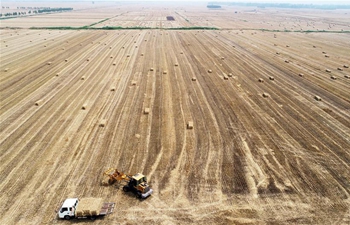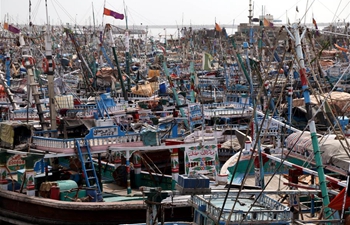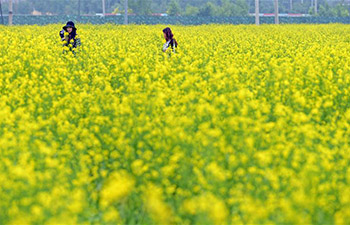NAIROBI, June 15 (Xinhua) -- Kenya has become a big market for food exports from its neighbors as erratic rains in the east African nation hit crop and livestock production.
Rains in the east Africa's biggest economy failed this season, starting in May instead of March and have since declined in most parts of the nation, including in breadbaskets, according to the meteorological department.
While this has turned to be a nightmare for Kenyan farmers, it has become a boon for farmers in Uganda and Tanzania where rainfall pattern was least affected this season.
According to Uganda National Meteorological Authority, rainfall in the March-June rainy season has been above average.
The farmers in the two countries are literary feeding Kenyans, with cities like Nairobi, Mombasa and Kisumu flooded with Tanzanian and Ugandan produce.
Topping the list of produce exported to Kenya by the neighbors are tomatoes, milk, eggs, onions, tomatoes, fruits, beans and maize.
At Wakulima market in the capital Nairobi, tens of tons of farm produce are delivered every day in trucks from Tanzania.
A survey at the market on Saturday indicated the major farm produce being delivered currently from the neighboring countries is potatoes, oranges and onions.
While produce from Uganda is shipped in through Busia and Malaba, that from Tanzania comes through Namanga, Isebania, Lunga Lunga and Taveta border points.
"Most of the produce being sold here currently is from Tanzania," said Mary Wangare, a trader.
"We are getting little from our farmers because we did not have rains for a long time, which disrupted the growing seasons," she added.
According to her, the produce from Tanzania and Uganda is fairly priced as compared to that from Kenya, some grown under irrigation in the past months.
"Kenyan farmers are selling a 90kg bag of potatoes at 3,500 shillings (35 U.S. dollars) but the same bag from Tanzania is going from 30 dollars or less," she said.
The foreign produce, according to Wangare, is also loved by traders not only because of its affordability, but it has a longer shelf-life.
"Onions from Tanzania are better cured than those from Kenya which makes them have a longer shelf-life preventing us from getting losses when we buy to sell," she said.
From Uganda, Kenya mainly imports maize and poultry products like eggs, with a 90kg bag of the grain from the country selling at 24 dollars currently. That produced in Kenya is going for 28 dollars in wholesale markets.
A crate of eggs from Uganda is selling in Kenya for as low as 2 dollars, making it traders' favorite.
Data from the East African Grain Council shows that in the first quarter of this year, Kenya imported more than 80,000 tonnes of maize from its two neighbors, earning Ugandan and Tanzanian farmers some 31 million dollars.
According to FarmGain Africa, bean exports through Busia regional trade hub to Kenya average over 100 metric tonnes per day, with a bag in Kenya going for 80 dollars.
With surge in imports, Kenyan farmers who are mainly using irrigation are feeling the pinch as they lack market for their produce, whose cost of production is high.
"Last month I went to sell my onions at 0.6 dollars per kilo and found there were those from Tanzania going for 0.50 dollars per kilo. I had no choice but to comply to dispose of the produce," said Bernard Kirathe, who farms under irrigation in Isinya, Kajiado County.
Beatrice Macharia of Growth Point, an agro-consultancy, noted that Kenyan farmers have been hard hit by erratic rains, an effect of climate change, as compared to their neighbors in Uganda and Tanzania.
"But the rains are not the only problem, the cost of production in Kenya is higher due to high input prices. For instance, Uganda offers subsidies on fertilizer and pesticides but Kenya is taxing them making production expensive," she said.
On June 13, Kenya re-introduced 16 percent tax on fertilizer, following a similar move in September 2018 when the government imposed taxes on pesticides. This would hurt farmers more, said Macharia, amid the changing weather pattern.
Kenya will open duty free maize imports from July to curb the current shortage of the grain that has seen prices rise 30 percent. Most the maize would come from Uganda and as far as Mexico.
According to the recently released 2019 Economic Survey, Kenya's exports to its neighbors in the East African Community stood at 1.29 billion dollars in 2018, down from 1.31 billion dollars in 2017, while imports from the region rose by 12 percent to 680 million dollars.













